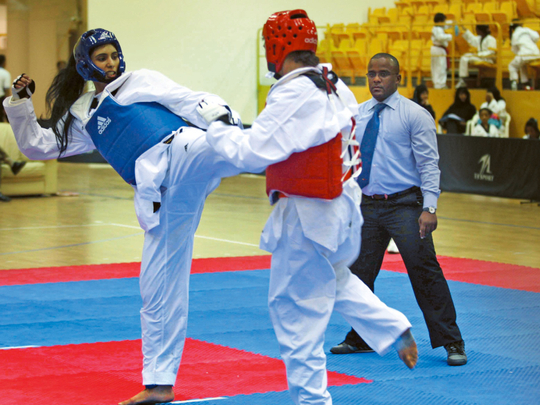
While karate, judo and more recently UFC-style mixed-martial arts (MMA) have each claimed their own demographic within the UAE, the “way of the fist and foot” remained aloof and largely unwanted like the misunderstood high school nerd dressed in a loose-fitting robe at the prom.
Usman Dildar, World Taekwondo Federation (WTF) Event Manager, told GN Focus awareness of art in the UAE was “very limited” because Gulf countries were late taking up the sport and any competitions available to them were restricted to regional events. And though much has been done to promulgate the sport in the emirates, there’s still a long way to go before it’s at the forefront of the martial arts sphere. Since the inauguration of the UAE Taekwondo and Karate Federation in 1990, a number of encouraging developments have unfolded to galvanise interest in the athletic expression of 20th century Korean culture. Dildar points to a number of cornerstone developments as crucial to pushing the taekwondo agenda in the UAE. “Rulers now attend almost all national competitions [and] support the activity strongly. Secondly, female taekwondo was introduced and reinforced.
“And when Mohammed Ishaq became the Secretary General of UAE Taekwondo Federation more national competitions, conferences, and courses were introduced, which [enabled] players to gain more competition experience and this led to more participation in international competitions,” Dildar says.
Role models
The UAE now boasts over 600 taekwondo martial artists — more than 50 of which are Emirati, according to UAE Taekwondo and Karate Federation statistics. Between November 2013 and May 2014, the UAE Taekwondo and Karate Federation will be hosting ten competitions for the clubs, universities and forces academies in the country. And, as of this year, the UAE will host a WTF International Open event each year.
The UAE has even had a handful of regal role models. Shaikha Maitha Bint Mohammad Bin Rashid Al Maktoum, daughter of Shaikh Mohammad Bin Rashid al Maktoum, Vice-President and Prime Minister of the UAE and Ruler of Dubai was the former captain of the UAE women’s taekwondo team, has competed at two Olympic Games (Beijing 2008 and London 2012) and won medals in regional competitions. This has helped root taekwondo into the sporting conscience of the country. Today, with a new crop of promising athletes trying to fill the void left by Shaikha Maitha since her departure for the polo field, the UAE has realistic hopes of participation in Rio 2016, says Mohammad Ishaq, Technical Secretary of the UAE Taekwondo and Karate Federation. “We have Jaber Jamal al-Ali who we will try to send to the Olympics in Brazil,” the taekwondo black belt and international referee tells GN Focus from the Federation’s offices in Uptown Mirdif, Dubai.
Global stage
As well as representing the UAE in the 2013 World Taekwondo Championships in Mexico, Jamal al-Ali has already achieved notable success on the international stage. He picked up bronze in the Middleweight (under 87kg) category in the 2012 Asian Taekwondo Championships in Vietnam, to become the first UAE medal winner in the event. Jaber is currently training at a joint Korean-UAE taekwondo camp in Korea.
But like any start-up sport in any emerging country, there are obstacles aplenty confronting Ishaq and his ambitious agenda. “The funding is too small. The [General Authority of Youth and Sports Welfare] give us a budget, but it’s not enough. If you want any sport to take off you have to spend money. Players look for rewards and medals, so we have to set up more and more competitions to encourage them to win and succeed,” Ishaq says.
“And if we’re looking to produce good national teams, we have to compete in a lot of international competitions, because if players go from training to Olympic competition, they don’t have any experience, they cannot perform well. All this also needs money, but our budget is small, so it’s hard,” he adds.
For the UAE’s current taekwondo crop to inspire future generations, the hard yards and capital has to go into procuring a thriving taekwondo culture. “We need no less than ten international competitions outside of the UAE to gain experience; we need to send athletes to training camps; we need to pay for equipment. So we need about Dh10 million to make good results with the sport,” Ishaq says.






